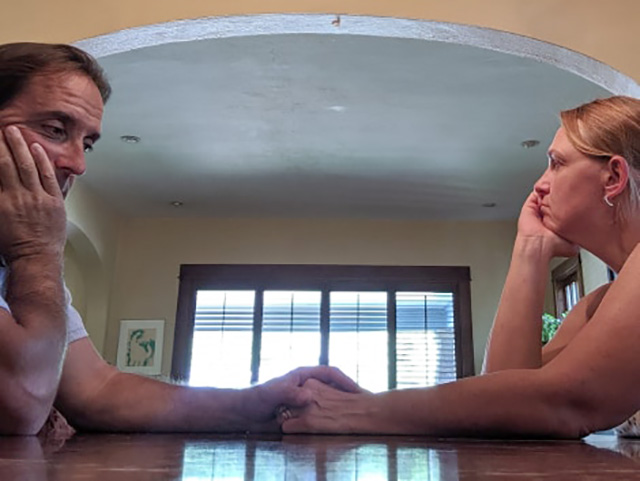
“I know you love me,” I said to my wife. “I just don’t think you like me.”
Her eyes shifted down and her empty stare fixed on her feet. I’d just stumbled onto her deepest, darkest, most tormenting secret.
“I know you love me, Sheri,” I continued. “We have four kids together, we have a business together, both of our names are on the mortgage. We’ve built this life together and we depend on each other because neither of us could do this alone. We’ve been together for so long that I can’t remember life before you.” Sheri was staring at the wall, at nothing in particular while I spoke. She just couldn’t bear to look at me.
She could say she loved me, because she did.
After what we’d been through, there was a bond, an eternal respect, and, on some levels, an unbreakable trust. It was unlike the unconditional love a parent feels for a child, but it was deep and permanent in a different way.
There really wasn’t anything romantic about the love Sheri felt for me. We’d been battling to restore intimacy since shortly after I quit drinking years ago. The love was about fulfilled material needs, division of chores and responsibilities, coparenting, and mutual respect. Frankly, from my best estimates from watching different couples move around the world, our love was stronger than most. But it wasn’t enough, and the root of the problem had just occurred to me. My wife loved me, but she really didn’t like me.
Alcoholism recovery is indescribably hard, and sobriety is just the first excruciating step. Alcohol has the properties of a liquid, meaning it is hard to contain, and it flows into every crack and cranny of our lives. Returning life to normal, to pre-alcohol status, is a universally debunked aspiration. It can’t happen. Alcoholism changes everything, and life in recovery, even when wildly successful, in no way resembles the pre-alcohol past.
Everyone involved has two options: they can learn about the disease that impacts their lives and find restorative peace, or they can suffer a kind of suffering with no end date, and that doesn’t naturally diminish over time. In fact, the suffering left behind when the alcohol dries up festers and grows and becomes increasingly debilitating. It is a most insidious pain, and it feeds on being ignored in the futile hope that it will go away.
Alcoholism is the disease of shame, deceit, isolation, and regret, and there is plenty to go around. The need to recover from my alcoholism isn’t confined to me, or me and my wife, or even me and my wife and kids. There are others who love me, and who I love, who need to recover, because alcohol is the darkness, and everything is different now in the light of day. I know it. I think we all know it. I’m not sure, because we rarely talk about it. That’s probably my fault, but I’m shouldering all the blame I’ve got the strength to carry right now, so it will have to wait. And fester.
Sheri and I spent about a year waiting for my sobriety to fix our relationship. I was working hard on my recovery, out of necessity, but that seemed so natural and obvious. I had to find the tools to defeat temptation, repair my damaged brain chemistry, handle emotions, learn patience, and grow my sobriety muscles. If I didn’t do the work, I would drink, and the recovery would be a failure. There was a direct logical line—a cause and effect—of my work in recovery. Everyone in my inner circle could see my need for recovery even as they ignored theirs.
In the second year of my sobriety, Sheri and I started working on the resentments between us. It was the wall alcohol built, and it wasn’t coming down without effort. So we churned through painful experiences where my drinking caused me to do and say reprehensible things. We also attacked the resentments from Sheri’s venomous retaliation. She didn’t have to drink for alcohol to turn her into a monster, too. Booze is as cunning as it is all inclusive in the destruction.
We talked to our kids, and helped them with their pain. I thought we had successfully protected them from my disease, and to a degree, we had. But kids are intuitive and impressionable, and they were developing into the permanent versions of themselves while a lot of really nasty sh*t was happening semi-quietly in the background. They couldn’t help but be impacted, and in recovery, we did our best to help them recognize and give voice to their pain.
Sheri and I read a lot about recovery, listened to the advice of therapists, and kept a constant dialogue going between us, about our feelings and the trust we were trying to rebuild. Sometimes we went deep and uncovered fears and insecurities. Other times, we couldn’t seem to break through the crusty surface of the day to day in search of a healing that seemed just too far out of reach. But we kept trying. We never stopped suffering through the progress of recovery.
We didn’t have a choice, really. Our lives were so intertwined with kids and home and work. Divorce just never made sense, in a really basic, fundamental way. It seemed the time for discussions of divorce had passed. When I was drinking, that was the time to break it off and give up. Active alcoholism was justification for tearing apart the family, and causing unavoidable trauma to our kids. But we made it through—we survived the worst of it. So any consideration of divorce during the aftermath felt like surviving a hurricane, then drowning in a puddle.
And there was love. There was always love. The love that was once in such grave danger as I drank my marriage apart was now on solid ground in sobriety. I was full of fear and doubt, but I knew I loved my wife completely. And I never doubted her love for me.
So what was wrong? Why weren’t we getting better? Why did the slightest innocent question seem to be loaded with doubt and disapproval? Why did looks exchanged and the most insignificant of gestures send us reeling back into the pit of relationship despair just like when alcohol flowed through my veins? Why wasn’t it better? Why couldn’t we release our relentless grip on the demonic pain?
As Sheri looked at her feet and shifted her weight nervously from side to side, I knew we had the answer. I finally understood. She did love me. She just didn’t like me, and that made all the difference in the world.
Why play checkers if you know how to play chess? Why eat a sandwich when there is filet mignon on the menu? Why wade in the pee-infested kiddie pool when the water is nice and clean in the deep end? My wife loved me. I knew it, and I loved her, too. We had reached the ultimate relationship goal. We were living in the marital promised land. We had love. It never occurred to me that my wife could love me, and at the same time, really not like me very much at all.
Sheri didn’t like my enthusiasm. She didn’t like my questions, and she often braced herself for my answers. She didn’t like to spend time alone with me, and she really didn’t like me in bed. She never hesitated to tell me she loved me, because love wasn’t the problem. Our love had survived my alcoholism, and seemed to be thriving in our recovery. But loving me, and liking what I was all about—well, those are two entirely different subjects all together.
Like many couples, we couldn’t try to go back to the friendship we had before the booze, because it was booze that brought us together from the start. We drank on dates. We drank at parties. We drank when we were with friends and we drank before we had sex. Life without alcohol was better, no doubt. But it wasn’t like it used to be. Sheri couldn’t tap into her memory of our time spent together in congenial sobriety. That time didn’t exist.
We had grown together in alcohol. When the alcohol turned on us, and when it was time for the alcohol to go, my wife found herself in love with a stranger.
Alcohol is a shortcut. It lowers inhibitions and disguises lust as love. It nudges people to thrust forward into relationships without foundations. Alcohol is isolating in a way that prevents deep and meaningful connection, and replaces human to human bonds with convenience and predictable circumstance.
Alcohol makes us lonely even when in a room full of people. And no one wants to be lonely. So alcohol can solve our loneliness problems, too.
And years later, when the alcohol is gone, and we realize love is not enough, we’ve got to learn to like our life partner. It turns out we’d skipped an important part of the recovery process. Critical, really, if I hoped that my wife would like me as much as she loved me.
Alcohol flowed into all the nooks and crevices, and it did prolific damage in ways that were obvious, and in ways that took years to detect. I wasn’t the only one who needed to recover from my alcoholism. Sheri had a lot of work to do in recovery, too. It turns out, you see, before my wife could begin to like me, she had to learn to like herself.
If you’d like to learn more about our recovery from alcoholism, please read our free ebook, He’s Sober, Now What: A Spouse’s Guide to Alcoholism Recovery.
~







Read 8 comments and reply